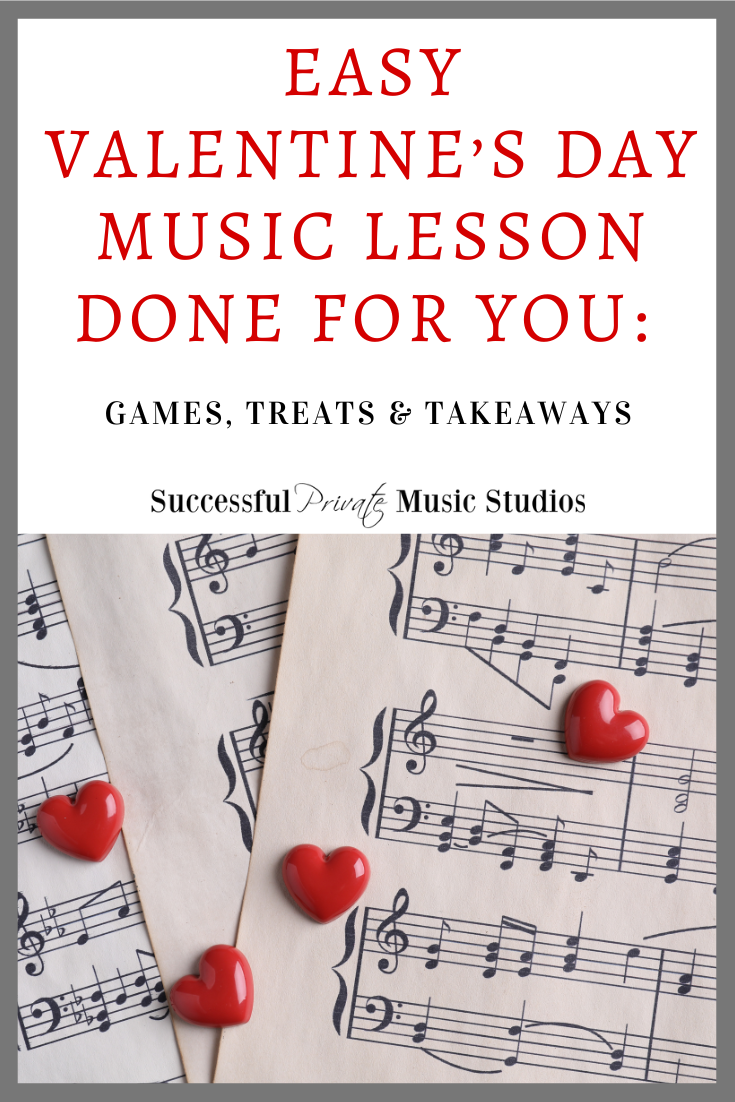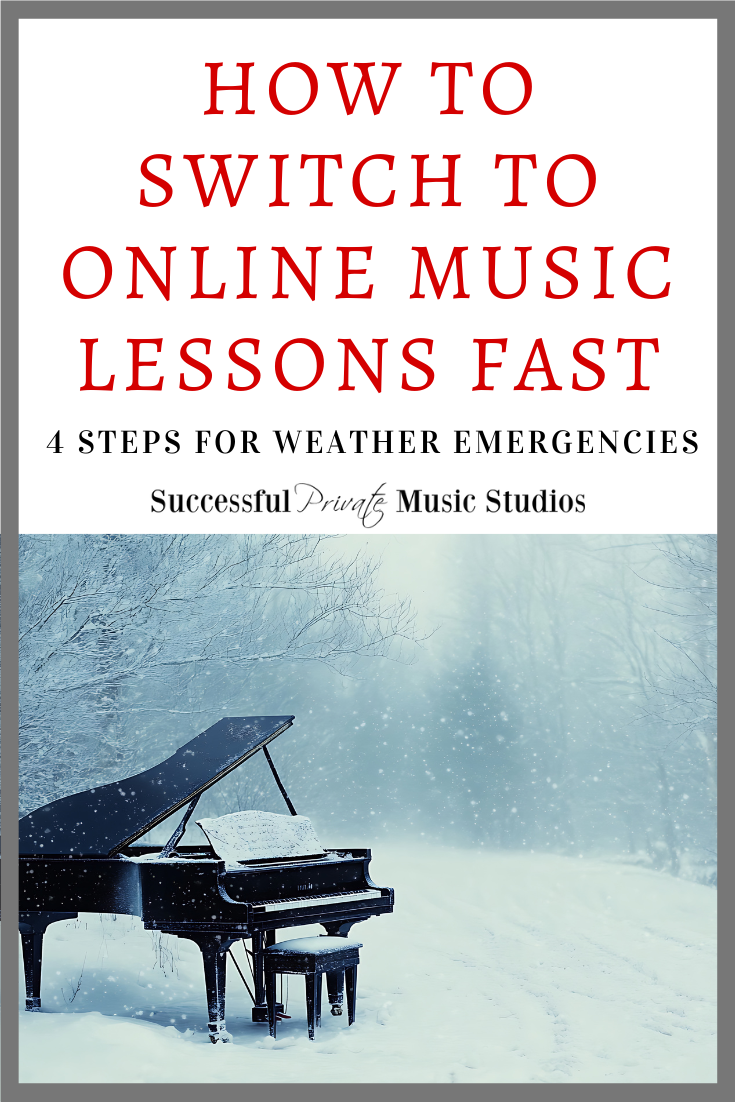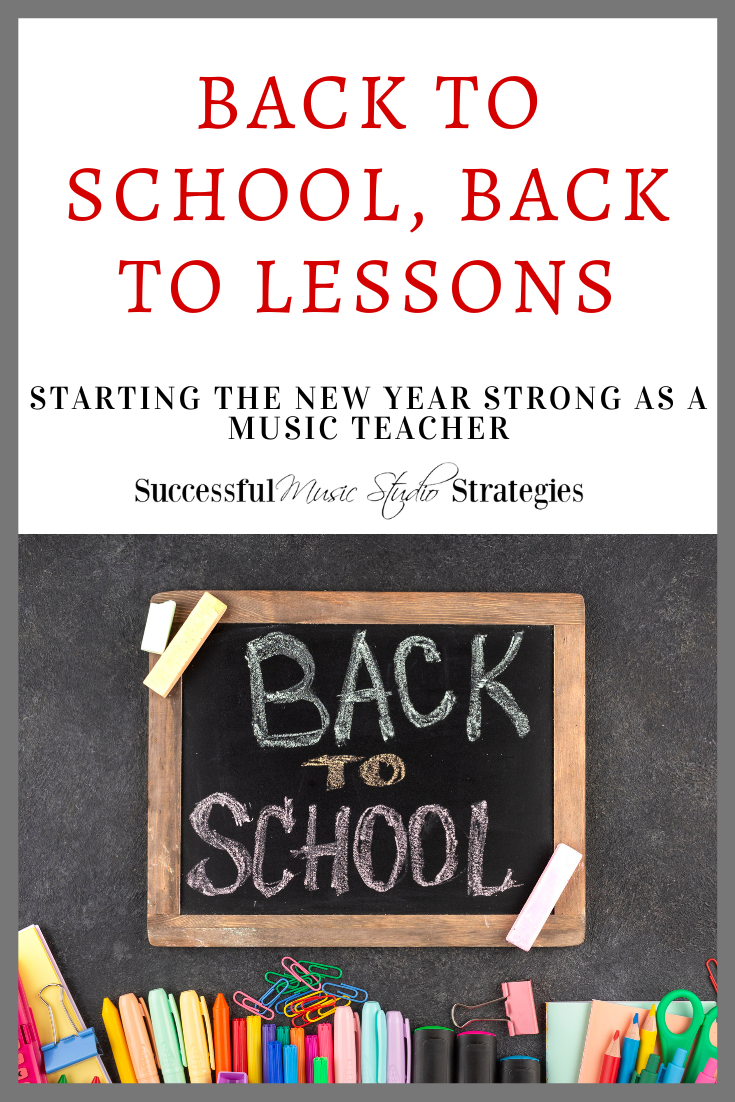Post Categories: What do you need help with?
Starting Your Studio
Keep Your Studio Running
Making Your Studio Thrive
Easy Valentine’s Day Music Lesson Done for You: Games, Treats & Takeaways
A Valentine’s Day Music Lesson Your Students Will Love
Valentine’s Day is the perfect excuse to sprinkle a little extra joy, color, and creativity into your music studio. This is something you can use during the entire week so everyone in the studio gets to have the fun “themed” lesson. Whether you teach piano, voice, strings, or general music, this themed lesson plan gives you a full class of festive fun—complete with games, treats, and a special skill students can proudly take home. Adjust it to fit your lesson length.
Below is a ready-to-use Valentine’s Day lesson you can plug straight into your studio schedule.
Warm‑Up: “Heartbeats & Rhythms”
Start the lesson with a quick rhythm warm‑up using the idea of a heartbeat. Have students tap quarter note, quarter note, 8th note quarter patterns (like ta–ta–ti‑ti‑ta) patterns on their lap, then create their own “heartbeat rhythm” to share. This sets the tone for a playful, musical session.
Three Valentine’s Day Music Game Ideas
1. Cupid’s Rhythm Toss
Place rhythm cards on the floor in a heart shape.
Students toss a small beanbag onto a card.
Whatever rhythm it lands on, they must clap, play, or sing.
Bonus: Let them earn a small sticker for each correct rhythm.
This game gets them moving and reinforces rhythm reading in a low‑pressure way.
2. Musical Matchmaker
Prepare pairs of cards: one with a musical term, one with its definition.
Scatter them face‑down like a memory game.
Students flip two at a time, trying to find the correct match.
You can tailor the difficulty by choosing terms appropriate for each student’s level—dynamics, tempo markings, intervals, or even note names.
3. Valentine’s Melody Hunt
Hide heart‑shaped cards around the room.
Each card contains a short melodic pattern or interval.
When students find one, they must play or sing it before collecting it.
This adds excitement and encourages quick recognition of melodic patterns.
Sweet Treat Ideas for the Lesson
Keep it simple, allergy‑friendly, and music‑themed:
Heart‑shaped fruit snacks
Pink or red wrapped chocolates
Mini Valentine pencils or erasers
A “You Make My Heart Sing!” sticker
A tiny heart‑shaped cookie (individually wrapped)
Treats don’t have to be sugary—small themed trinkets feel just as special.
Special Skill of the Day: “The Love Chord”
End the lesson with a musical takeaway they’ll remember.
Teach students a new chord or interval and call it the Love Chord for the day. Depending on their level, this could be:
A simple C major chord
A I–V–I progression
A major 6th interval (because it sounds warm and sweet)
A short two‑measure Valentine melody they can play for their family
Have them perform it once at the end of the lesson so they leave feeling accomplished and celebrated.
Final Thoughts
Valentine’s Day is a wonderful opportunity to build connection, spark creativity, and make music lessons feel magical. With a few themed games, a small treat, and a special musical takeaway, your students will walk out smiling—and eager for next week.
Happy Teaching!
Becky
How to Switch to Online Music Lessons Fast: 4 Steps for Weather Emergencies
How to Switch to Online Music Lessons in a Pinch
This week with the SNOWpocalypse, I had to switch to online lessons. I’ve got a massive hill in front of my house and students coming here, or me leaving to drive to my lessons wasn’t an option. Bad weather doesn’t have to derail your teaching schedule—or your income. One of the biggest gifts you can give yourself as a studio owner is a simple, reliable plan for moving lessons online at a moment’s notice. When snow, ice, or unexpected emergencies pop up, having a system in place keeps your studio running smoothly and your students progressing without interruption.
Below is a streamlined, teacher‑friendly guide you can implement today so you’re never scrambling again.
Step 1: Choose Your Online Platform Before You Need It
Don’t wait until the storm hits to decide how you’ll connect.
Pick one primary platform and one backup option:
Primary: FaceTime (my preferred), Zoom, or Google Meet
Backup: A second app your students already have access to
Make sure:
Your device is updated and charged
Your camera and microphone work
You know how to share your screen or audio if needed
🎶 Tip: Add your meeting link to your studio policies or welcome packet so families always know where to go.
Step 2: Create a Quick-Send Communication Template
When weather changes fast, you don’t want to spend 30 minutes crafting a message.
Prepare a short script you can copy, paste, and send to all families. Something like:
“Due to weather conditions, all lessons today will be held online at your regular time. We’ll meet on FaceTime/Zoom. If you lose power or internet, please let me know as soon as possible.”
Save this in your notes app, email drafts, or studio management software so it’s always ready.
Step 3: Keep an Online-Friendly Lesson Plan on Standby
Online lessons run best when you have a structure that works specifically for the virtual format. It’s best to have a copy of all the method books your students use on hand for this reason (or if a student ever forgets their music, you can continue as planned) Just know, you won’t be able to get through the lesson at the same speed as normal as internet connection issues happen, or there’s a delay on the line. Teaching online has always been just a little bit slower in progress. But it can be done. But you can also have the following to help make the lesson more fun and run smoothly.
Have a small collection of “online-ready” activities you can pull out instantly:
Digital flashcards
Rhythm echo games
Play-along tracks
Sight-reading apps
Short technique challenges
A few printable worksheets you can email if needed
This ensures your lesson stays engaging—even if the switch was last-minute.
Step 4: Prepare for Power or Internet Issues
Weather can be unpredictable, so build flexibility into your plan.
Have a policy in place for:
What happens if you lose power
What happens if they lose power
Whether lessons are rescheduled, refunded, or skipped
How students should notify you if they can’t connect
You can also keep a portable charger nearby so your phone stays powered for FaceTime lessons or communication.
Final Thoughts
A smooth transition to online lessons isn’t about perfection—it’s about preparation. With a clear plan, a ready-to-send message, and a few online-friendly activities in your back pocket, you can turn a stressful weather day into a seamless teaching day.
Happy Teaching!
Becky
5 Essential Marketing Techniques to Boost Your Music Teaching Business
If your music teaching studio feels more echo chamber than concert hall lately, you're not alone. Many talented instructors struggle to attract a steady flow of students—not because they aren’t skilled, but because they aren’t marketing effectively. Here are five essential marketing strategies to help turn things around and bring life back to your studio.
1. Define Your Unique Brand
Pinpoint your strengths: Are you known for preparing students for conservatories? Making lessons fun for kids? Supporting adult beginners?
Craft your story: Share what makes your approach distinct on your website and social media.
Use consistent visuals: Choose a logo, colors, and design style that reflect your personality and teaching style.
Your brand is what makes people remember you—it’s not just a name, it’s an experience.
2. Build a High-Quality Website
Make it mobile-friendly: Most parents and students search on their phones first.
Include testimonials, pricing, and scheduling tools: Transparency builds trust.
Showcase your studio vibe: Photos, videos, and sample lesson clips add a human touch.
If your website doesn’t inspire someone to click “Book a Lesson,” it’s time for a makeover.
3. Leverage Local SEO & Directories
Claim your Google Business profile: This gets you on the map—literally.
Use keywords like “piano lessons near me” or “violin teacher in [your town]” in your website copy.
Get listed on directories: MusicTeacher.com, TakeLessons, and Thumbtack are just a start.
When your studio is hard to find online, it's like playing music into the void.
4. Create Community Connections
Offer free workshops or open houses at local schools or community centers.
Partner with music stores and libraries: Ask to leave flyers or give mini demos.
Volunteer at events: Presence builds visibility and credibility.
Join a local ensemble: This has been the biggest attractor for me. People see me perform, as if I teach and I hand them a business card or tell them how to access my website.
A familiar face becomes a trusted teacher faster than any ad ever could.
5. Amp Up Your Social Media Game
Post short reels or stories of your students (with permission!) to show progress and excitement.
Share tips and mini tutorials: "How to practice scales without going crazy" goes a long way.
Engage with your local community: Comment on school pages, tag local groups, and participate in trending challenges.
Join the local mom’s group on Facebook: People are always asking for music teacher information on there and the more often your name comes up, the more other mom’s notice
Social media isn’t just noise—it’s your microphone to reach future students.
✨ Final Note: If you’re struggling to fill vacancies in your music studio, marketing is not optional—it’s your lifeline. Start small, pick one or two of these techniques, and build from there. As your visibility grows, so will your student roster.
Happy Teaching!
Becky
Back to School, Back to Lessons: Starting the New Year Strong as a Music Teacher
There’s a special kind of magic in the air when the school year begins—new pencils, fresh notebooks, and the hum of possibility. As music teachers, we don’t just dive into rhythm and repertoire; we help shape the confidence, discipline, and creativity of our students. And that first week back? It's our overture to what can be a transformative year.
Whether you're running a private studio or teaching in a school setting, here are a few reflections and strategies to help you kick off the new teaching year with purpose and spark:
Reset & Reflect: What’s Changed?
Before the students walk through the door, take a moment for yourself. Reflect on what worked last year—and what didn’t. Were your students motivated? Did lessons feel purposeful? Use these reflections to tweak your approach. A small shift in your teaching rhythm can lead to big changes in engagement.
Establish Your Studio Vibe Early
The tone you set in the first lessons will carry through the year. Don’t just teach—create a culture. Introduce studio policies with warmth and clarity, share your enthusiasm for the music you’ll explore, and show students (and parents) that you value communication and consistency.
Some ideas:
A welcome newsletter or email outlining expectations
A studio calendar with lesson dates and performance opportunities
A shared document where students can track their progress and goals
Make Goals a Conversation
Start the year by talking with each student about their aspirations. Are they prepping for challenges in band or auditions? Hoping to learn to play by ear? Wanting to write their own song? Set individual goals together, write them down, and revisit them monthly. That intentionality gives lessons direction—and students ownership.
Celebrate More Than Achievement
Success isn’t just mastering a new piece—it’s showing up, trying again, and learning how to listen. Consider ways to celebrate your students beyond recitals:
Highlight weekly “effort awards”
Share progress with parents via short notes or recordings
Post achievements on a studio bulletin board or social media
The more visible their growth, the more motivated they’ll become.
Keep Growing Yourself
Teachers need fuel too. Join a local music teacher group like MTNA, look for community ensembles or groups you can join, dig into new repertoire, or collaborate with other educators. Growth isn’t just for students—your passion and curiosity are contagious, and they keep your teaching fresh.
Listen with Intent
Every student comes with a story—especially at the start of a new year. Some have practiced all summer, others are coming in cold. Some are excited, others anxious. Take the time to listen to where they are musically and emotionally. It’s the best way to meet them where they are—and help guide them forward.
Final Note
The back-to-school season isn’t just about routines and checklists. It’s about reigniting purpose, reconnecting with students, and renewing your own love for teaching. So take a deep breath, tune your heart as well as your instruments, and dive in.
Here’s to a vibrant year filled with music, momentum, and meaningful moments.
Happy Teaching!
Becky
Practice with Purpose: Creative Ways to Motivate and Engage Your Music Students
Practicing is the cornerstone of musical progress, but let’s face it: keeping students motivated to practice can sometimes feel like an uphill battle. As educators, it’s our job to make practicing not only effective but also fun and engaging. When students practice with purpose and enthusiasm, they make meaningful progress while developing a lifelong love for music. Let’s explore some creative ways to incentivize practice and keep your students inspired!
1. Gamify the Practice Experience
Transform practice into a game to keep it exciting and rewarding:
Practice Challenges: Create weekly or monthly challenges, like mastering a tricky passage or playing a piece flawlessly three times in a row. Offer small rewards, like stickers, certificates, or even virtual badges.
Progress Charts: Use charts or apps where students can track their practice time or accomplishments. Seeing their progress visually can be highly motivating.
Practice Bingo: Design a bingo card with different practice tasks (e.g., “Play with perfect dynamics” or “Practice for 20 minutes without stopping”). Completing a bingo earns students a reward.
It’s not too late to get access to the Spring 2026 DONE FOR YOU Practice Challenge with the Practice To Performance Challenge Kit! Get it blow or learn more HERE
2. Personalize the Journey
Every student is unique, so tailor their practice experience to match their interests and goals:
Repertoire Selection: Choose pieces that resonate with their musical tastes or connect to their favorite artists. Personal passion fuels motivation.
Creative Assignments: Encourage them to compose their own short pieces or create variations on a song they love.
Student-Driven Goals: Let them set their own practice goals, whether it’s learning a specific piece, mastering a technique, or preparing for a performance.
3. Incorporate Technology
Leverage digital tools to modernize and enhance the practice experience:
Apps for Practice: Apps like Tonara, Piano Maestro, or Simply Piano make practice interactive and fun by providing feedback, tracking progress, and offering rewards.
Recording Sessions: Have students record themselves during practice. Listening back not only helps them identify areas for improvement but also lets them celebrate how far they’ve come.
Virtual Duets: Pair students with you or other students for online collaborative performances. Technology allows for creative engagement, even outside the lesson room.
4. Celebrate Achievements
Recognition can go a long way in motivating students:
Practice Awards: Hand out awards for consistency, improvement, or creative effort during practice sessions.
Showcase Talent: Create opportunities for students to share what they’ve learned. Recitals, studio showcases, or even sharing videos online can be a great way to acknowledge their progress.
Highlight Milestones: Celebrate when they reach a significant milestone, like completing a challenging piece or mastering a new technique.
5. Foster a Growth Mindset
Encourage students to view practice as an opportunity for growth rather than a chore:
Celebrate Effort, Not Just Results: Praise their dedication and improvement, even if they don’t get it perfect right away.
Teach Problem-Solving: Show them how to break down difficult sections into manageable parts. This empowers them to approach challenges with confidence.
Focus on Fun: Remind them that music is about joy and expression. A light-hearted approach helps create a positive association with practice.
6. Get Families Involved
Parents and guardians play a key role in encouraging practice:
Parent-Student Practice Sessions: Encourage parents to participate in practice time, even if it’s just as an audience.
Practice Logs: Provide logs where parents can leave encouraging notes or observations about practice sessions.
Family Recitals: Organize informal performances at home, fostering a supportive environment where students feel proud to share their progress.
Final Thoughts
Engaging students in practice doesn’t have to be a struggle. By incorporating creativity, personalization, and a sense of fun, you can transform practice into a purposeful and enjoyable part of their musical journey. Remember, the ultimate goal is to help students build a lifelong connection with music—one that inspires passion, perseverance, and joy.
Now it’s time to take these ideas and start inspiring! How will you make practicing purposeful and fun for your students today? 🎶
Happy Teaching!
I’m Becky and Welcome To Successful Music Studio Strategies where I help you create your own Successful Private Music Studio business through simple strategies I’ve learned and used in my own successful private music studio! Want to learn more about my online courses to help you start, build and create a successful and THRIVING music studio? Click here!
Bookkeeping Powerhouse Mini course and Studio Policy Templates NOW AVAILABLE!









